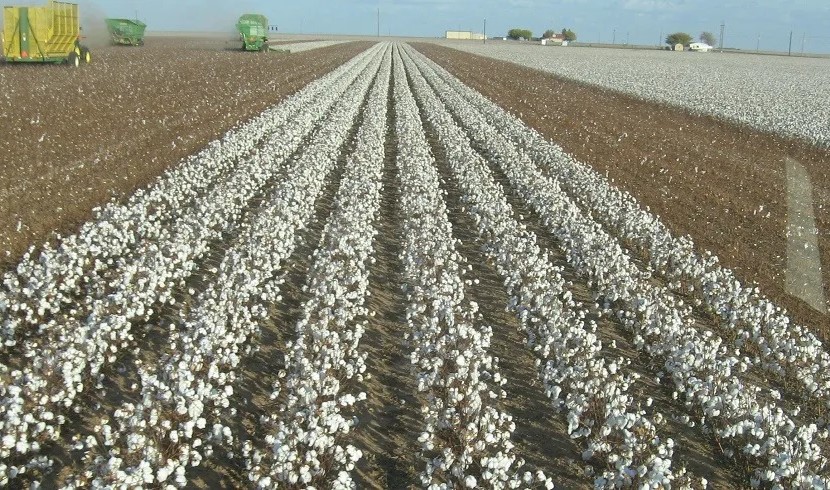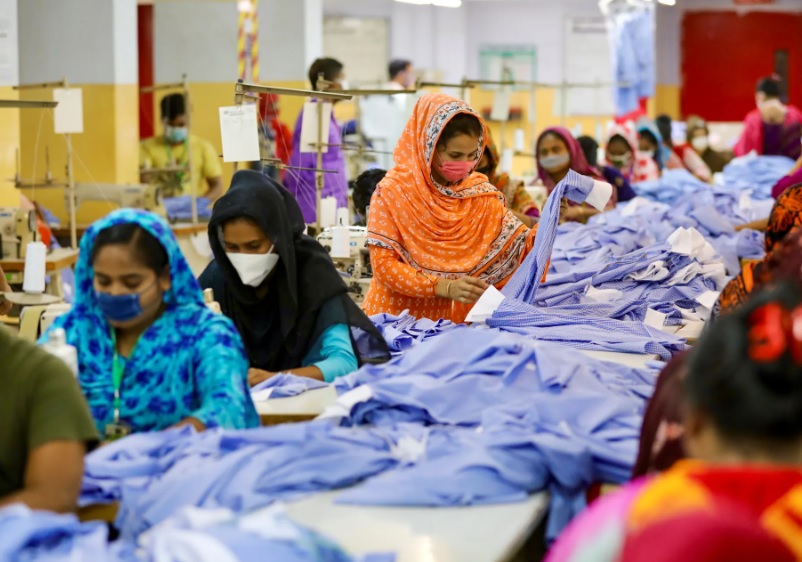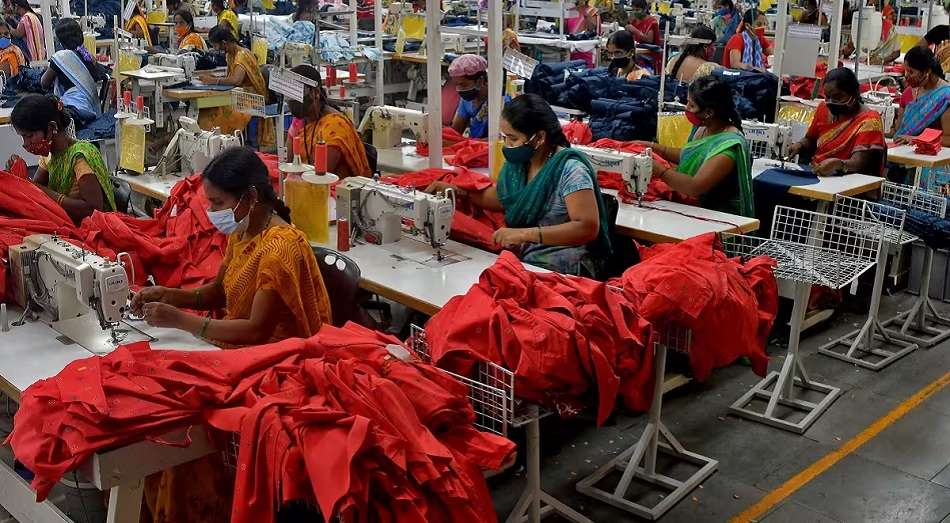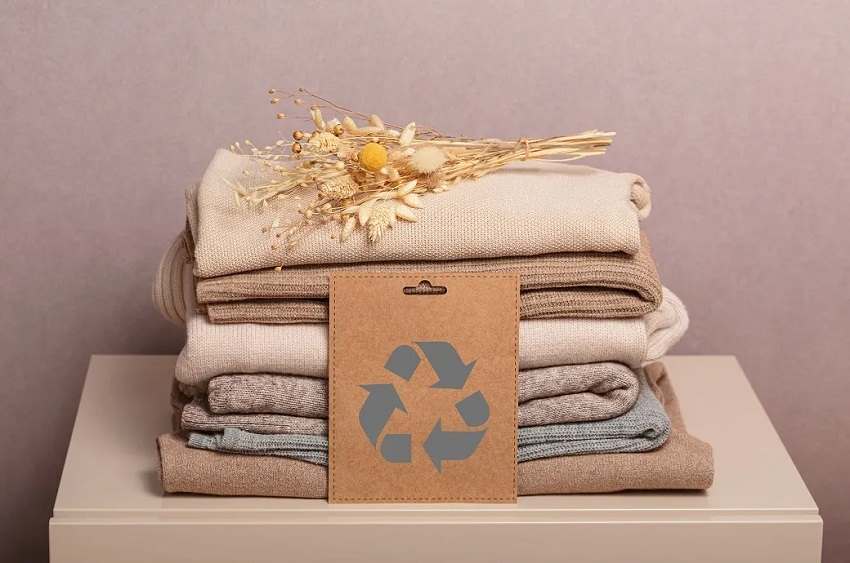FW
"Fashion cycles change faster than one can imagine. From just a few collections a year, fast-fashion brands such as Zara now offer more than 20, while Sweden’s H&M manages up to 16. It’s a big shift from days when there were only 3-4 collections a year. While this has gone down well with fashion police but it’s impacting the environment in a major way. McKinsey estimates, from pesticides in cotton fields to denim washes, making 1kg of fabric generates 23 kg of greenhouse gases on an average."

Fashion cycles change faster than one can imagine. From just a few collections a year, fast-fashion brands such as Zara now offer more than 20, while Sweden’s H&M manages up to 16. It’s a big shift from days when there were only 3-4 collections a year. While this has gone down well with fashion police but it’s impacting the environment in a major way. McKinsey estimates, from pesticides in cotton fields to denim washes, making 1kg of fabric generates 23 kg of greenhouse gases on an average.
The clothing life cycle has drastically reduced to half compared to earlier. However, global clothing companies know well that customers demand eco-friendly clothing these days. Clothing companies such as Nike have already started taking positive measures. According to eco-experts, one obvious way by which firms can answer environmental concerns is to use renewable energy to power their facilities. Additionally, they can cut back sharply on water and chemical use; and can develop new materials and manufacturing processes that reduce inputs.
Brands take the first green steps

H&M was the largest buyer in the world of ‘Vetter cotton’ last year—that is, cotton produced under a scheme to eliminate the pesticides and encourage strict water management. It grows in 24 countries and represents about 12 per cent of the 25m tonnes of cotton produced each year globally. Kirsten Brodde of Greenpeace highlights that H&M has eliminated toxic per- and polyfluorinated chemicals from its lines (which are used to make garments waterproof). Nike’s Flyknit method of weaving items, including trainers, reduces waste by 60 per cent in comparison with cutting and sewing. Flyknit products have a large following: revenues from the line came to more than $1bn in the last fiscal year.
These are only a handful of companies taking green steps, others don’t even measure their overall environmental impact. Introducing green collections can even carry a risk for brands, informs Steven Swartz of McKinsey because it’s quite possible that a shopper will shift from wearing a consciously green T-shirt to other kinds of clothing owing to changing fashion trends.
Some brands have started encouraging customers to recycle old clothes by returning them to stores. But almost all apparels today are made of a mix of materials—often including polyester. Separating them out is difficult and mechanical methods of recycling degrade fibres. Chemical methods are too expensive to be viable. Shipping second-hand clothes off to countries in Africa and Asia is also an issue. Even if local markets are large enough to absorb them, the poorer quality of polyester-mixed garbs means they do not survive long.
As a pathbreaking achievement British designer Tom Cridland, has created men’s clothing designed to last three decades, thanks to strong seams and special treatments to prevent shrinking. He expects revenues of $1m this year, but admits that his model will be hard to scale. Patagonia, a maker of climbing and hiking gear, sends vans to campuses to help students patch up jackets and trousers. It helps others with greenery, too. After discovering a type of material for wetsuits that, unlike neoprene, requires no oil to make, Patagonia shared the findings with surfing brands such as Quiksilver. Such innovations are the critical need of the hour. At last, style may be forever but today’s model of clothing production is not.
Zund Systemtechnik has bought Zund Plotting Systems.
Zund Systemtechnik is based in Switzerland and specialises in developing and manufacturing digital cutting systems. Zund Plotting Systems is based in the UK and supplies and services precision digital cutting systems.
Zund UK will continue to serve the UK and Irish markets, as in the past, but with the added benefit of being even more closely aligned with its parent company in terms of sales and service.
Zund UK is the distribution and service partner of Zünd Systemtechnik
Zünd Systemtechnik looks forward to strengthening its position in the UK market and continuing to expand its customer base. This acquisition means it will have its representation in the United Kingdom.
The additional resources Zünd Systemtechnik can provide will accelerate Zund Plotting’s growth and further integrate its customer support.
Among Zünd Systemtechnik’s customers are manufacturers and service providers in the graphics, packaging, textile and leather industries, as well as in technical textiles and composites.
The company has sales and service organizations in China, Thailand, USA, India, Netherlands and Italy.Established in 1993, Zünd UK has rapidly become one of the industry leaders. It offers a range of new G3 and S3 cutters, cutting table options and finishing solutions.
Vietnam’s earnings from garment and textile exports in the first quarter of 2017 rose 12.4 per cent against the same period last year. Exports to new markets grew strongly, with Russia up 115 per cent, Singapore 38 per cent, Cambodia 36 per cent and Brazil and India 34 per cent.
Traditional markets like the United States and the European Union saw more humble export growth at 6.3 to 6.4 per cent.
Exports of traditional products grew by 13 to 17 per cent while exports of newer ones, including swimming suits, raincoats and scarves, increased by 18 to 41 per cent.
New products and different ways to approach markets have resulted in higher and more stable growth, while helping the industry rely less on traditional partners.
Exports are expected to increase by ten per cent in the second quarter of the year based on the recovery of main markets such as the US, the EU and Japan as well as the stability of the global economy and politics.
The industry aims at a ten per cent growth to reach 32 billion dollars in export turnover in 2017. To achieve the goal, businesses have been encouraged to invest in new equipment and enhance competitiveness with new technologies.
SPG Prints’ digital textile printer offers quality and value to textile printers who are taking the first step into digital production.
The Javelin has several multiple-pass scanning printing modes that can print high-resolution images up to 1,200 dpi on a variety of substrates. It uses 36 Fujifilm Dimatix Samba print heads and SPG Prints’ unique Archer technology to produce variable drops for optimal control of detail and saturation.
The printer offers flexibility in configuration for use with acid, reactive and disperse inks from SPG Prints. Its capability of printing up to two million linear metres annually on a wide range of substrates makes it an ideal solution for printers taking their first steps into digital production, and those wishing to supplement an existing digital capability.
Printers can use the Javelin with a wide range of substrates and achieve high levels of print quality.
Modern retailing demands shorter runs, faster turnarounds and shortened supply chains with no compromises on colour or print quality. The Javelin printers offer this capability to different ends of the volume spectrum.
SPG is a company in the textile, label and industrial printing markets. It provides total systems solutions, with a portfolio including screens, lacquers, inks, digital engravers, and a range of rotary screen and digital printing systems.
Oeko-Tex will promote sustainability at The Summer Conference and at The AAFA Product Safety Seminar, to be held at The Fashion Institute of Technology (FIT), the epicenter of the apparel industry, June 5 to 8, 2017.
Oeko-Tex is an independent textile testing institute working for enhanced product safety and sustainable production in the textile value chain.
The Summer Conference at FIT will address sustainability standards, closed loop, and circular economies, farm to fashion, and textile innovations.
Oeko-Tex will host its 25th anniversary reception for all conference participants, customers, media representatives, and other colleagues at FIT.
Anna Czerwinska, the International Oeko-Tex Association’s head of marketing and communication, will discuss third party standards at the FIT summer conference event. Representatives from other certification organisations and certified manufacturers will join the panel as well. Czerwinska will also moderate the State of Sourcing – Trends, Shifts, and Looking Ahead panel at the AAFA Sourcing Conference on June 7, 2017.
Globally harmonised standards like those in the Oeko-Tex system set the bar for defining and measuring textile safety and sustainability. From raw materials through to the final product, third party certifications help brands and retailers reassure consumers that products are made in environmentally and socially responsible ways and are safe for people to use.
The ready-to-wear sector in Iran has long been impacted by the sanctions, but has nevertheless grown, adopting a series of avoidance strategies throughout the 35-year sanction period.
Iranian sales representatives Mana Sharifi and Patrick Sinz stated that the conference in the early 2016, 99 per cent of apparel imports in Iran were made illegally. Among European countries, Italy is the leader in terms of clothing exports to Iran, Italian products accounting for 52 per cent of European apparel items exported to the country. France ranks fourth in this respect.
Iran is a large country by European standards, with a population of 82 million which still harbours deep disparities in economic means. Nearly 7per cent of Iranians are very well off, and a large number of them belong to the middle class, a boon for western labels.
According to Patrick Sinz, the apparel market in Iran is tricky, but more mature than it seems. Window-display dummies must be headless, brand logos cannot be too transgressive. Even if they follow these rules however, international brands and retailers still have to win over the trust of Iranian consumers.
The country's isolation has given rise to a host of parallel channels and to a large market in counterfeit goods, particularly in ready-to-wear apparel. Agreeing to this Patrick Sinz and Mana Sharifi, Iranian clients must be reassured about the authenticity of the products they purchase. They also want to make sure they buy at a price that is similar with that prevalent in an item's country of origin.
Iranians are social-media savvy and they are regular patrons of airport fashion stores. Over the years, they have always managed to get hold of the clothes they wanted. They are well-travelled and know how to compare prices. Iranian consumers seek exclusivity and peer recognition. They pay special attention to the 'chic factor' in what they buy, and they like to stand out for their outfits and fashion accessories.
Intertek one of the leading testing and quality assuring company, recently has re-declared their goal to become the leading global Total Quality Assurance provider. The company was addressing representatives from a range of industries including leading retailers, brands, and manufacturers of apparel and footwear companies at an event to mark the launch of Intertek’s bold new brand identity. The event was presided over by Karthik N.D., Country Managing Director, Intertek Bangladesh.
A recent release from the company has informed that Bangladesh and across the world, Intertek offers customers a Total Quality Assurance value proposition, assisting organisations as their trusted quality partner providing ATIC (Assurance, Testing, Inspection and Certification) solutions which go beyond assuring the quality and safety of a corporation’s physical components and assets to also look at the reliability of their operating processes.”
Organizers of the event has informed that Intertek’s history spans over 130 years and dates back to some of the world’s leading pioneers in scientific innovation and industry. It is a powerful legacy which has been handed down from great founders Including Thomas Edison, who invented the first incandescent lightbulb. Intertek’s new brand identity is inspired by Edison’s passion for innovation.
Intertek’s ATIC services focus on a number of areas, including Softlines and Business Assurance Business Lines, being two of company’s major business lines. Intertek’s Total Quality Assurance commitment plays a significant role in each stage of the supply chain, from Research and Development to Consumer Management, with a focus on global delivery’.
The company has informed that changing the colour and logo is only one aspect of Intertek’s new brand identity. Intertek is differentiating it by shifting the focus from a standalone service provider to a Total Quality Assurance service provider. Intertek is a leading Total Quality Assurance provider to industries worldwide. Through a network of more than 1,000 laboratories and offices and over 42,000 people in more than 100 countries, the Group is re-defining the industry with its Total Quality Assurance proposition.
European Textile Services Association (ETSA) will have a conference in France, June 14 to 16, 2017.
This year, the bi-annual event is expecting around 120 to 130 participants. The conference is open to top management of ETSA member companies and associations.
ETSA's mission is to promote the textile services industry and the interests of member companies, in cooperation with national textile services associations across Europe.
Since 1994, ETSA has represented the industry-leading textile service companies, suppliers of garments, detergents and machinery and national associations across Europe.
The textile services industry supplies timely and cost effective textiles, usually on a rental basis, to an extensive range of professional end-users in a wide variety of industries. Textile services companies are committed to providing services for a healthy and safe workplace, while maintaining the greatest possible concern for the environment.
Every day, millions of people across Europe wear, sleep on, eat off or use rental textiles in some way or another. Rental textiles include work wear and protective clothing, corporate business wear, hospital and surgical textiles, textiles for hotels, restaurants and care homes, hand-drying towels, floor mats and mops and industrial wipers. Textile services include textile selection, garment manufacturing, stock management, logistics and delivery, care and maintenance.
A special cell will be created in Faisalabad Chamber of Commerce and Industry (FCCI) to familiarize local exporters with recently introduced Registered Exporter System (REX) in order to facilitate the Pak exports to EU countries under GSP Plus scheme, says engineer Muhammad Saeed Sheikh, President FCCI.
He explained the GSP plus status given to Pakistan in 2014 and told that its basic objectives were to dilute the damages caused to Pak economy due to war on terror. He further says that during 1st year of this facility Pak exports recorded a phenomenal growth of 23 per cent but after that the exports experienced a steep decline. Government of Pakistan has taken a number of steps including uninterrupted electric supply to the industrial sector and declaring five important export sectors zero rated from July 2016 to mitigate its problems but still the exports are not stable he added. He appreciated the recently introduced REX scheme and stated that it will further facilitate Pak exporters to make their exports to the EU countries without any hassle and unnecessary procedural bottlenecks.
He further pointed out that it is actually a self-certification system and many European countries are already following it to streamline the exports from Pakistan under GSP plus to the EU countries. He also mentioned saying that as REX is a new system and many exporters are not fully aware of its modalities, hence Trade Development Authority of Pakistan (TDAP) has arranged this seminar. The FCCI has also decided to setup a cell which will provide much needed awareness and guidance to the local exporters.
Engineer Asim Munir, Chairman FCCI addressed the seminar saying that the local TDAP office should be further strengthened to facilitate local exporters to enhance their participation in international textile exhibitions.
Nadia, Kanwal Shehryar, Dost Muhammad, Faqeer Muhammad, and Allah Dad Tarar Director TDAP Faisalabad also addressed the seminar and explained in detail the modalities of the REX system. They stated that TDAP is fully aware of the export potential of Faisalabad and it was in this respect that TDAP is regularly arranging different awareness sessions to facilitate the exporters of Faisalabad.
Cambodia’s real growth is projected to remain strong, expanding at 6.9 per cent in 2017 and 2018.
Risks to this outlook include the fallout from further rises in US interest rates, a slower-than expected economic recovery in Europe, and uncertainties over global trade.
US monetary policy tightening is expected to result in the dollar appreciating vis-a-vis the euro and other currencies, which would make Cambodia’s exports and tourism relatively more expensive for the rest of the world, and therefore less competitive.
Continued interest rate hikes in the US may weaken prospects of further capital inflows to Cambodia. Any disruption in global trade flows will have substantial negative impacts on Cambodia, given its high level of dependence on exports, particularly garments and footwear, as one of the main drivers of economic growth.
Improving labor productivity would be fundamental for Cambodia to remain competitive, given rising competition from other low-wage garment exporting countries.
As a result of competition from low-wage countries, year-on-year growth of garment exports from Cambodia fell to 8.4 per cent in 2016, compared with 12.3 per cent growth in 2015.
Growing competition slashed garment export prices to all major destinations. Export prices to the US market were the hardest hit, dropping by 7.2 per cent in 2016.











